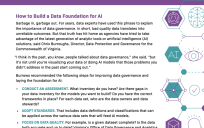Supply chain resilience is now a crucial focus for federal agencies, as they aim to secure continuous service delivery while mitigating risks that arise from global interdependencies. As new technologies rapidly evolve, government leaders are increasingly aware of the need to fortify their supply chains against disruptions, cyber threats, and resource challenges. By investing in a technology-enabled, resilient supply chain, agency heads can ensure a secure, efficient, and responsive government infrastructure, even amidst disruptions.

Key Elements of Resilient Supply Chains
Cybersecurity and Risk Management: With the adoption of digital tools such as IoT and cloud computing, federal supply chains are more connected than ever. However, this connectivity exposes them to cyber vulnerabilities. Building resilience starts with integrating cybersecurity measures that protect these new digital frameworks. The National Institute of Standards and Technology (NIST) suggests using its NIST SP 800-161r1 framework for developing a robust supply chain risk management approach. Agency heads should implement these frameworks to proactively assess vulnerabilities, ensuring that each supplier and technology partner upholds security standards.
Data Analytics and Predictive Modeling: Predictive analytics tools allow agencies to anticipate disruptions before they happen, using historical and real-time data to identify patterns that might indicate impending challenges. Agencies can utilize analytics to track data on vendor performance, resource availability, and logistics flow, making them better equipped to address potential issues. During the COVID-19 pandemic, agencies that used predictive analytics were able to adjust rapidly to the challenges of global supply chain disruption, sustaining critical operations while many industries faced shortages and delays.
Enhanced Collaboration and Communication: An interconnected supply chain requires a high level of collaboration among suppliers, agencies, and other partners. The Department of Homeland Security (DHS) emphasizes that joint strategies between the private and public sectors are essential for resilient supply chains. Leaders should foster communication networks and collaborative frameworks, such as shared databases and joint task forces, that facilitate transparent, up-to-the-minute data sharing. This helps eliminate gaps in information flow, allowing agency heads to respond to supply chain issues as they emerge.
Strategic Recommendations for Agency Leaders
Agency leaders should prioritize integrating advanced tools like zero-trust architectures and AI-driven monitoring systems. Zero-trust models, which enforce strict access control protocols, prevent unauthorized access across supply chain networks and minimize vulnerabilities. AI tools, on the other hand, enable real-time monitoring, allowing leaders to detect and address irregularities early. This combination of cybersecurity and predictive capabilities ensures resilience, even when supply chains face unprecedented challenges.
Additionally, federal agency leaders can enhance resilience by implementing routine supply chain audits and providing ongoing training to employees and partners, building a culture of vigilance and adaptability. By focusing on creating resilient, technologically sophisticated supply chains, government agencies are better equipped to fulfill their mission, maintaining service continuity for citizens and staying resilient in the face of emerging threats.
Dr. Rhonda Farrell is a transformation advisor with decades of experience driving impactful change and strategic growth for DoD, IC, Joint, and commercial agencies and organizations. She has a robust background in digital transformation, organizational development, and process improvement, offering a unique perspective that combines technical expertise with a deep understanding of business dynamics. As a strategy and innovation leader, she aligns with CIO, CTO, CDO, CISO, and Chief of Staff initiatives to identify strategic gaps, realign missions, and re-engineer organizations. Based in Baltimore and a proud US Marine Corps veteran, she brings a disciplined, resilient, and mission-focused approach to her work, enabling organizations to pivot and innovate successfully.





Leave a Reply
You must be logged in to post a comment.